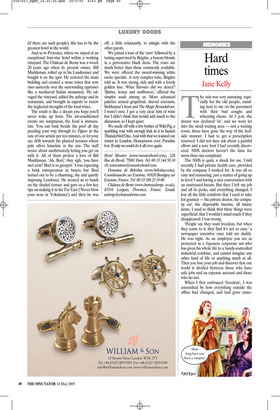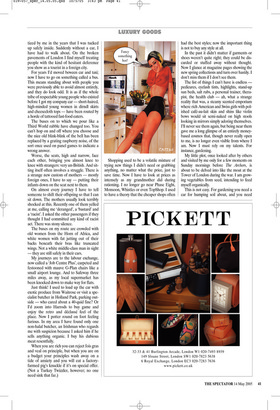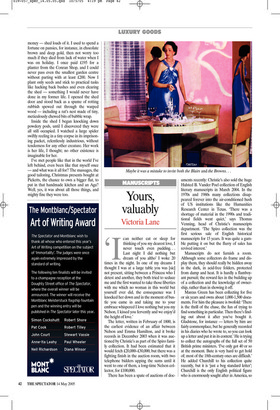Hard times
Jane Kelly
The rain was very annoying, especially for the old people, standing next to me on the pavement with their bad coughs and wheezing chests. At 3 p.m. the doctor was declared ‘in’, and we were let into the small waiting area — not a waiting room, those have gone the way of the bedside manner. I had to get a prescription renewed. I did not dare ask about a painful elbow and a sore foot I had recently discovered. NHS doctors haven’t the time for more than one complaint.
The NHS is quite a shock for me. Until recently I had private health care, provided by the company I worked for. It was all so easy and reassuring, just a matter of going up to level 5 and having a nice conversation with an unstressed locum. But then I left my job and all its perks, and everything changed. I lost all the little comforts that I used to take for granted — the private doctor, the company car, the disposable income, all luxury items. I used to think that these things were superficial, that I wouldn’t mind much if they disappeared. I was wrong.
‘People say they want freedom, but when they come to it, they find it’s not so easy,’ a newspaper executive once told me darkly. He was right. As an employee you are as protected as a Japanese corporate ant who has given his whole life to a family-controlled industrial combine, and cannot imagine any other kind of life or anything much at all. Then you lose your job and discover that our world is divided between those who have safe jobs and an expense account and those who do not.
When I first embraced ‘freedom’, I was astonished by how everything outside the office had changed, and had gone unno ticed by me in the years that I was tucked up safely inside. Suddenly without a car, I have had to walk about. On the broken pavements of London I find myself treating people with the kind of hesitant deference you show as a tourist in a foreign city.
For years I’d moved beween car and taxi; now I have to go on something called a bus. This means standing about with people you were previously able to avoid almost entirely, and they do look odd. It is as if the whole tribe of respectable young people who existed before I got my company car — short-haired, high-minded young women in dirndl skirts and cheesecloth tops — have been routed by a horde of tattooed fast-food eaters.
The buses on to which we pour like a Third World rabble have changed too. You can’t hop on and off where you choose and the nice old blink-blink of the bell has been replaced by a grating raspberry noise, of the sort once used on panel games to indicate a wrong answer.
Worse, the seats, high and narrow, face each other, bringing you almost knee to knee with strangers: very un-British. And sitting itself often involves a struggle. There is a strange new custom of mothers — mostly foreign ones, I have to say — putting their infants down on the seat next to them.
On almost every journey I have to tell someone to shift their offspring so that I can sit down. The mothers usually look terribly shocked at this. Recently one of them yelled at me, calling me ‘deranged’, a ‘bastard’ and a ‘racist’. I asked the other passengers if they thought I had committed any kind of racist act. There was stony silence.
The buses on my route are crowded with old women from the Horn of Africa, and white women with fat jutting out of their backs beneath their bras like truncated wings. Not a white middle-class man in sight — they are still safely in their cars.
My journeys are to the labour exchange, now called a ‘Job Centre Plus’, carpeted and festooned with mauve G-Plan chairs like a small airport lounge. And to Safeway three miles away, as my local supermarket has been knocked down to make way for flats.
Just think! I used to load up the car with exotic produce from Waitrose or visit a specialist butcher in Holland Park, parking outside — who cared about a 40-quid fine? Or I’d zoom into Harrods to buy game and enjoy the retro and déclassé feel of the place. Now I potter round on foot feeling furious. In my area I have found only one non-halal butcher, an Irishman who regards me with suspicion because I asked him if he sells anything organic. I buy his dubious meat resentfully.
When you are rich you can reject fois gras and veal on principle, but when you are on a budget your principles wash away on a tide of anxiety and you will eat a factoryfarmed pig’s knuckle if it’s on special offer. (Not a Turkey Twizzler, however; no one need sink that far.) Shopping used to be a volatile mixture of trying new things I didn’t need or grabbing anything, no matter what the price, just to save time. Now I have to look at prices as intensely as my grandmother did during rationing. I no longer go near Phase Eight, Monsoon, Whistles or even TopShop. I used to have a theory that the cheaper shops often had the best styles; now the important thing is not to buy any style at all.
In the past it didn’t matter if garments or shoes weren’t quite right; they could be discarded or stuffed away without thought. Now I glance at magazine pages showing the new spring collections and turn over hastily. I don’t miss them if I don’t see them.
The list of things I can’t have is endless pedicures, eyelash tints, highlights, stand-up sun beds, salt rubs, a personal trainer, therapist, the health club — ah, what a strange reality that was, a steamy scented emporium where rich American and Swiss girls with polished café-au-lait skin and shins like violin bows would sit semi-naked on high stools looking in mirrors simply adoring themselves. I’ll never see them again, but being near them gave me a long glimpse of an entirely moneybased cosmos that, though never really open to me, is no longer even visible from where I am. Now I must rely on my talents. For instance, gardening.
My little plot, once looked after by others and visited by me only for a few moments on Sunday mornings before The Archers, is about to be delved into like the moat at the Tower of London during the war. I am growing vegetables from seed, intending to feed myself organically.
This is not easy. For gardening you need a car for humping soil about, and you need money — shed loads of it. I used to spend a fortune on pansies, for instance, in chocolate brown and deep gold, then not worry too much if they died from lack of water when I was on holiday. I once paid £195 for a planter from the Conran Shop, and I could never pass even the smallest garden centre without parting with at least £200. Now I plant only seeds and stick to practical tasks like hacking back bushes and even clearing the shed — something I would never have done in my former life. I opened the shed door and stood back as a spume of rotting rubbish spewed out through the warped wood — including a rat’s nest made of tiny, meticulously chewed bits of bubble wrap.
Inside the shed I began knocking down powdery pods, until I discovered they were all still occupied. I watched a large spider swiftly reeling in a tiny corpse in its imprisoning packet, relentlessly industrious, without tenderness for any other creature. Her work is her life, I thought; no other existence is imaginable for her.
I’ve met people like that in the world I’ve left behind, even been like that myself once — and what was it all for? The massages, the good tailoring, Christmas presents bought at Picketts, the chance to own a bigger flat, to put in that handmade kitchen and an Aga? Well, yes, it was about all those things, and mighty fine they were too.




































































 Previous page
Previous page